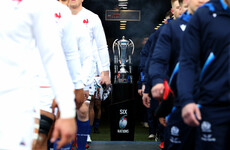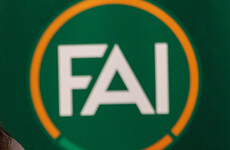IT IS HARD to imagine now but when dawn broke on 3 May 2008, Leinster had only one trophy to their name in the professional era. Ulster had three. They still do. By the end of that month, Munster would have four, including a second Heineken Cup.
No one knew change was on its way, that by 8pm that evening when Leinster claimed their second Pro14 title, that they’d go on to play in six European finals – Amlin Cup included – and win five.
Of late, they’ve gained the kind of stranglehold on the Pro14 that Dublin have enjoyed in the All-Ireland SFC, winning the last three championships, reaching 10 out of 12 finals.
There have been glitches. Back in 2015, they ended up fifth after winning only half their 22 matches. Dragons beat them home and away; Treviso held them to a draw while Matt O’Connor’s side posted two wins and four defeats from their interprovincial derbies.
Remember, that’s just six years ago. In the years since, they have finished runner-up, semi-finalist, winner, winner, winner and now, as of Saturday, finalists.
More to the point they have got there with a shadow team, albeit the most talented group of back-ups in Irish rugby history. You’ve Devin Toner, Josh van der Flier and Luke McGrath, heroes from Ireland’s 2018 victory over the All Blacks; you’ve World Cup finalist Scott Fardy; Six Nations champion, Dave Kearney; Ireland internationals Rhys Ruddock, Ross Byrne, James Tracy, Ed Byrne and Michael Bent. Then there are players like Rory O’Loughlin and Ross Molony, who never get mentioned as possible Ireland players but who turn up every dark Friday when the internationals are away and points are needed in dimly lit Rodney Parade or Scotstoun.
Without them, Leinster wouldn’t be in a final. Without these ego-free squad men, Johnny Sexton would be stuck on two Pro14 medals. He certainly wouldn’t be chasing a sixth.
Yet by the time Sexton leads Leinster out for this year’s final, you have to wonder who’ll be behind him, the November, February and March men, who kept the till ticking over while the internationals were away, or the players who’ve answered Ireland’s call.
“The main thing is for the group that’s here is to put in two decent performances (against Zebre and Ospreys) so that they give themselves a shot at getting picked for what is going to be very, very big games,” said Leinster coach Leo Cullen after Saturday’s win in Belfast.
So, what does he do then? Against Italy, Andy Farrell’s backline consisted entirely of Leinstermen. Conceivably he could pick an all-Leinster XV against Scotland, too, and they’d have a strong chance of beating them: Keenan; Larmour, Henshaw, Ringrose, Lowe; Sexton, Gibson-Park; Healy, Kelleher, Furlong; Ryan, Baird; Ruddock, Connors, Conan.
Of the above, only one – Rhys Ruddock – played on Saturday. “Some of the international guys have had a break over this week, and prior to their game against Italy as well, so even though they’ll have had two big test matches (before the 27 March Pro14 final against Munster) they should be coming back in pretty good shape,” said Cullen.
The shape Leinster are in is enough to make their rivals envy. They had 17 key men missing on Saturday, Ulster had three. Yet Leinster won by 19 points. Asked what they had to do to close the gap, Ulster captain Jordi Murphy – a former parishioner of the RDS – replied: “I don’t know.”
To be fair, he also went on to say he thinks the gap is closing, echoing the views of his coach, Dan McFarland. “I like to think the difference is not as big as Saturday’s scoreline shows and that’s the really disappointing thing because I didn’t get to see how close we would have been (because of the game-changing red card to Andrew Warwick in the first half and Robert Baloucoune’s disallowed try in the second half). Maybe I’m totally wrong. Maybe that scoreline does say where we are but I don’t think so.”
Can they be stopped? The answer to that, McFarland firmly believes, is yes.
“There is a level of intensity to their game that other teams cannot match, the speed that they play at when they’re on the front-foot in attack, their aggression when their backs are to the wall in defence,” McFarland said.
“We’re about the closest (to them); Munster are obviously up there, but we’re not close enough to be consistently better than them. You look at how they play, there’s nothing magic. Their system, their shape in attack, their system in defence, it’s not very different to everyone else.
“It’s particular to them but it’s not the system that’s winning, it’s the individual components coming together into a collective to make that system so impressive. The rest of us aren’t trying to emulate what they’re doing but we are striving to make our collectives so good that we’re able to beat them. Do I think we’ll get there? I do, yeah. I’m an optimist.”
He’ll have to wait until the Rainbow Cup – assuming it goes ahead – for his next chance. It’s over to Johann van Graan now to see what plan he can come up with. It’ll need to be a good one.














He’s not as disappointed as some on relation to how far off they are? They are miles off. No offence to Munster but they are an average,though very gutsy and committed side,and they have hammers Leinster twice in a row now. I do agree that they haven’t had any continuity with combinations,especially from 9-13,and hopefully when the likes of OBrien, Healy, Moore, Teo, McFadden etc come back then there will be a big improvement.
I must take the opportunity to praise Matt O’Connor for the huge improvement in Guinness Pro12 teams. Ever since he arrived at Leinster, every other team has greatly improved. Teams, that two years ago were almost brushed aside by Leinster, have now reached the heights that Leinster once inhabited alone.
Treviso have improved, Munster have improved, Edinburgh have improved, Scarlets have improved, Dragons have improved, Zebra have improved, Connacht (brilliant tonight, by the way) have improved..
In fact, they have all improved so much that Leinster has great difficulty taking on any of them.
By extension, Wasps and Harlequins have shown just how brilliant they are too due to you Matt.
I can hardly wait to see how much Castres get better when they arrive at the RDS soon. They will build statues in your image all over the town.
Matt, you have done European rugby a great service. They have all reached and surpassed Leinster this season thanks to your input at Leinster and everywhere else.
Thank you Matt and Happy New year!.
(and also to Mr Caputo, the news paper seller. Your influence on all other teams has been exceptional)